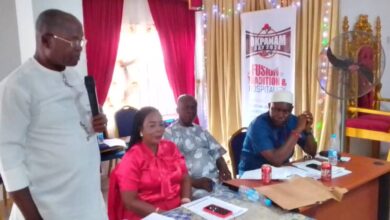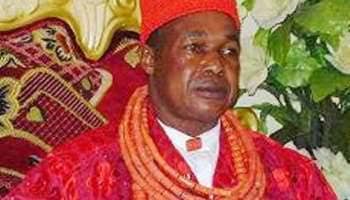News
Preye Aganaba Promises Reforms in Bayelsa Waterways
By Ese Ejero Jesse
The All Progressives Congress’ candidate contesting for Bayelsa Central Senatorial District at the National Assembly, Preye Aganaba, has vowed to bring reforms to the Bayelsa State waterways if elected in the forth coming election.
He made this known recently when he paid a courtesy visit to the Ebinanaowei of Bomo Kingdom, King Joshua Igugburu X (JP), in Yenagoa.
Preye Aganaba explained that the Ijaw course has lost its theme, and that the idea that led to the creation of Bayelsa State has not been transferred to the current set of leaders that the state has, noting that these are some of the reasons he wants to represent the people.
He stressed that Bayelsa State is still backward when compared to states like Lagos in their Internally Generated Revenue (IGR). He said the oil which the state relies on will run dry, that the water is a resource that will never end.
According to him, the National Inland Waterways Authority Act is not friendly to the state, noting that it is a crime against Bayelsans and all other people that live in riverine states.
He stated that these laws need to be repealed especially now that they have a Bayelsan as the President of the country.
He further said that, after doing a broad research on the waterways, he found out that, if these laws are repealed, Bayelsa State will be having an IGR of over N15 billion Naira monthly. He also said that Lagos state is making about N5 billion Naira every month from IGR after challenging some of those laws.
Explaining the benefits of these laws to Bayelsans if amended, he stated that it is unfair for one to buy a flying boat and register it with the federal government, that the various states governments should be collecting the IGRs.
He stated that Bayelsa Central Senatorial District has always believed in zoning, that nobody should use his position in power to shift it, that now is the turn of KOLGA to produce a senator in the district, calling for support from the various traditional rulers to enable him win to help the state create its own wealth.
Responding on behalf of all the traditional rulers present, King Joshua Igbugburu noted that his coming to solicit for support from them is a sign of respect for the traditional institutions. He prayed God to grant him success in his campaign and used the medium to advice all politicians to put aside the spirit of thuggery and bitterness among themselves, that their part as traditional rulers is to play advisory roles and pray for peace of Bayelsa and the country at large.


